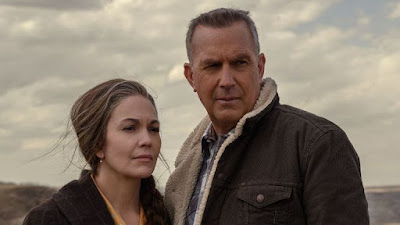Bezucha denotes that Donnie is trouble simply in a shot looking over George’s shoulder from a parking lot as he glances up at Donnie leaning over a balcony railing, Costner’s demeanor conveying skepticism and speaking to “Let Him Go’s” welcome tendency to let an image speak a few hundred words. In other ways, though, Bezucha’s movie remains frustratingly vague. Though we know Margaret’s desire to rescue Jimmy is at least partially wrapped up in the physical abuse Lorna suffers at the hands of Donnie, gleaned in a shot from Margaret’s point-of-view, we never know what drew Lorna to Donnie in the first place. Why she stays with him could, one might theorize, connect to the era’s traditional mores, though that is never explicated, visually or otherwise. And that has the added effect of reducing little Jimmy to nothing more than a symbol. Indeed, that’s essentially what George says to Margaret, that her need to rescue Jimmy is tied up in needing to replace what’s been lost, an astute reading strangely eluding the movie itself.
Still, the journey out to North Dakota to find the Weboys and, by extension, Jimmy is some of the movie’s best stuff. Despite the quest’s urgency, the tone is languid, and Bezucha lets us luxuriate in the chemistry of Costner and Lane, these two glorious old pros who emit the full sense of having lived together so long, non-verbally communicating in these small, knowing smiles at the other’s behavior, the front seat of their car coming across no different than their dinner table, evoked in how they eat pie off their laps and sip coffee from a thermos. Their relaxed love, however, is contrasted against the Weboys’ distinct creepiness, epitomized in the matriarch Blanche (Lesley Manville), filtering Ruby Weaver through Lady Macbeth, or something. Her introductory shot, framed in the low light of a hanging lamp, clutching the sides of her dinner table, could have been excised from a Bond movie. And the way Manville relishes wrapping her lips around the words “pork chops” is at least as scary as Christopher Walken saying “Cornflakes” in “At Close Range”, her accent, if you will permit me, like Kate McKinnon’s Hillary Clinton at its most unhinged. And though Blanche might initially suggest the extreme antithesis of Margaret, her monologue about relocating her family from Florida to North Dakota to reestablish hereditary order by repairing their own domestic rift, suggests they are more alike than Margaret realizes.
It might be the 1960s but “Let Him Go” winds up feeling just as much like the 1870s, like this is another Lincoln County War, a regional feud between factions. Blanche’s sons, in fact, never really feel like sons or characters at all, just henchmen, willing to be sacrificed for the cause, and the climactic confrontation in which George sets off, against his own better judgment, to set things right echoes Costner’s own “Open Range” (2003) in which his and Robert Duvall’s characters led an uprising in an 1880s frontier town. “Let Him Go” even includes a Native American character, Peter Dragswolf (Booboo Stewart), who offers shelter and aid to the Blackledges, and briefly suggests the family’s quest might be intended as some sort of spiritual balm for America. That’s a grand metaphor beyond the reach of Bezucha’s film, which never quite knows what to do with Peter’s character. But sometimes the ferocity of genre machinations supersedes the need for a broad societal statement, and the visceral power of Lane and Manville squaring off at movie’s end, it turns out, is all the truth “Let Him Go” needs.





No comments:
Post a Comment